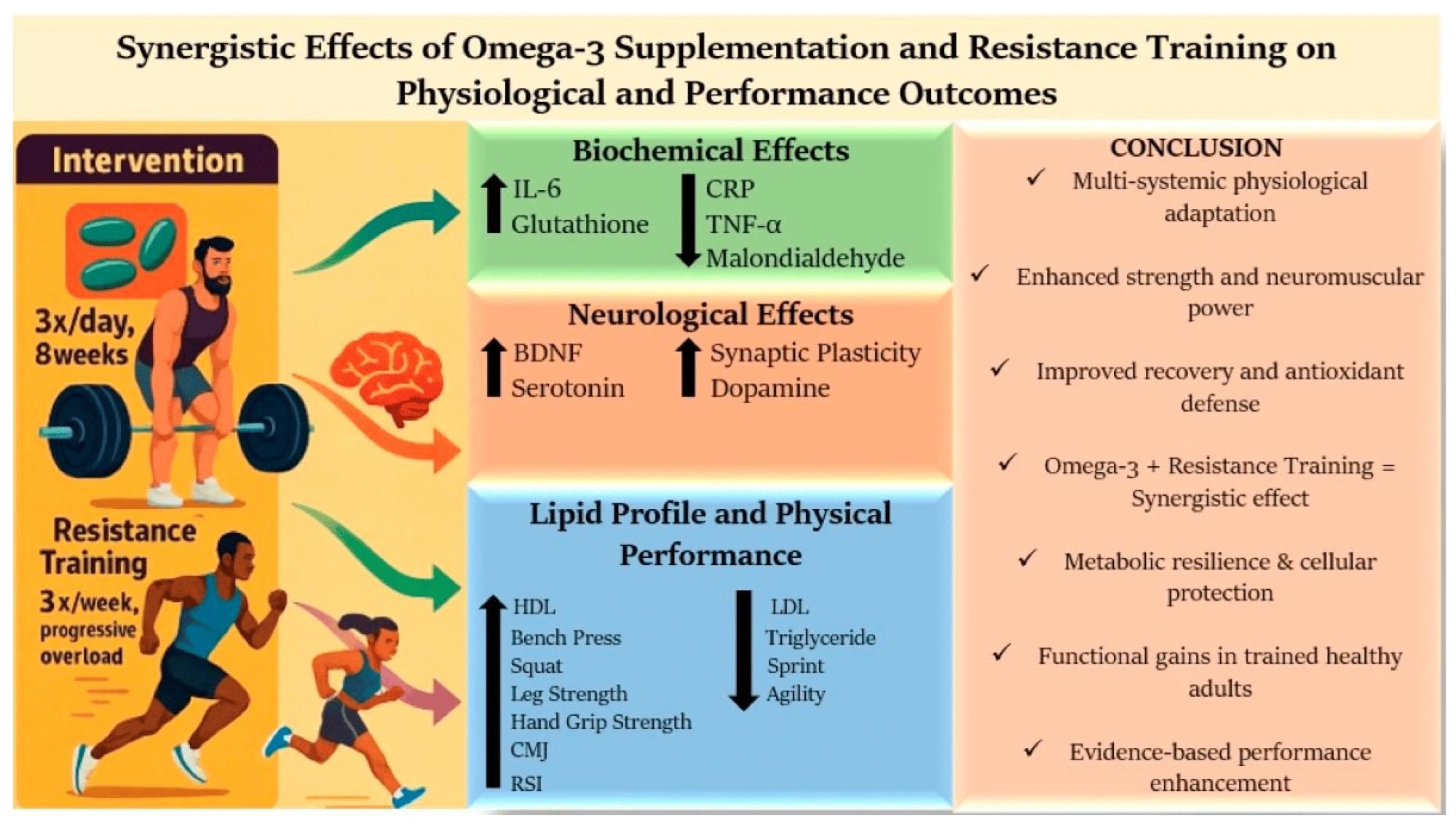A new study shows that pairing fish oil supplements with weight training can enhance antioxidant defenses, improve lipid levels, and sharpen neuromuscular function, even in already fit young men.
 Study: The Effects of Omega-3 Supplementation Combined with Strength Training on Neuro-Biomarkers, Inflammatory and Antioxidant Responses, and the Lipid Profile in Physically Healthy Adults. Image Credit: onebit / Shutterstock
Study: The Effects of Omega-3 Supplementation Combined with Strength Training on Neuro-Biomarkers, Inflammatory and Antioxidant Responses, and the Lipid Profile in Physically Healthy Adults. Image Credit: onebit / Shutterstock
Among other measures for a healthy lifestyle, omega-3 fatty acid supplements are popular due to their anti-inflammatory and antioxidant effects. Recently, a team of researchers examined the effects of omega-3 supplements when combined with strength training in healthy men. The report was published in the journal Nutrients.
Introduction
Exercise, nutrition, and stress management are the traditional pillars of a healthy lifestyle. With the rise of specialized and intensive physical training modalities, alternative solutions are now needed to maintain health and enhance physical performance. Omega-3 supplements are commonly used by physically active individuals and professional athletes.
Oxidative stress during exercise increases free radical production. When this overwhelms the muscle cell's antioxidant capacity, it results in inflammation and muscle cell damage, adversely affecting health and muscle performance.
Sports nutrition aims to prevent this by providing adequate energy and nutrition during strength training and intense exercise, including omega-3 supplements. These fats, such as EPA and DHA, must be obtained from the diet, primarily from oily fish and plant foods like walnuts, chia seeds, flaxseeds, Brussels sprouts, and kidney beans, as the body cannot synthesize them. Both EPA and DHA are key anti-inflammatory molecules that promote heart and brain health.
The conversion of EPA and DHA from plant-based sources is limited, making seafood or supplementation preferable for optimal intake.
In athletes, omega-3 supplements have been shown to reduce fatigue and inflammation after exercise. They enhance muscle protein synthesis in response to anabolic stimuli via the mTOR (mechanistic target of rapamycin) signaling pathway. This builds muscle mass and strength.
They accelerate muscle recovery and adaptation to training. They also enhance nerve transmission and nerve membrane fluidity while reducing inflammation. Yet few studies have explored how omega-3 supplements affect the outcome of resistance training.
The current study assessed changes in physiological and physical adaptation to exercise training. It employed biochemical markers and indicators of neurological and functional alterations following exercise. It aimed to garner evidence for future nutritional strategies to optimize athletic recovery and performance over the long term.

About the study
The study included 30 physically active male participants (aged 18–30 years) who were randomized into either an experimental group, undergoing standardized resistance training three times a week and receiving daily 3150 mg of omega-3 supplements (1620 mg EPA and 1170 mg DHA), or a control group with only resistance training. The study period was eight weeks.
Numerous biomarkers were analyzed in this study. They included inflammatory mediators that indicate immune activation and tissue stress following high-intensity exercise. Their elevation can predict poor exercise recovery and training adaptation. Glutathione and malondialdehyde serve as markers of oxidative capacity, while blood lipids indicate cardiometabolic health and physical fitness.
Brain-derived neurotrophic factor (BDNF), dopamine, and serotonin are biomarkers of neuronal health and function. These are deeply involved in cognitive flexibility, balancing inhibitory and excitatory neurotransmitters, synaptic plasticity that helps build neuronal pathways, and neuromuscular function.
Study findings
Omega-3 supplements markedly improved physiological markers of exercise recovery and training adaptation after resistance training. They had significant anti-inflammatory effects while also increasing antioxidant capacity. In addition, they improved markers of cardiometabolic risk, neurological function, and motor development.
Lipid markers
Lipid markers showed an 8% to 10% reduction in ‘bad’ cholesterol – low-density lipoprotein (LDL) cholesterol and triglycerides – and an 11% rise in ‘good’ high-density lipoprotein (HDL) cholesterol, suggesting a lower cardiovascular risk.
Animal studies suggest that higher unsaturated fatty acids increase lipid oxidation and inhibit lipid synthesis. Fish oil exerts more potent cholesterol-regulating effects than monounsaturated fatty acids because of its polyunsaturated fats.
Inflammation and oxidative stress
Inflammatory markers like interleukin-6 (IL-6) and TNF-α were reduced by ~27–41%. Antioxidant capacity mounted, with 15% higher glutathione and 33% lower malondialdehyde levels.
Neuromuscular markers
Neurological markers like BDNF, dopamine, and serotonin also increased by 12–19%. Physical performance improved as shown by increased muscular strength and power. So did speed, agility, and reflexes, compared to the controls.
The higher DHA concentrations enhanced the functional activation of fast-twitch type II muscle fibers and led to improvements in neuromuscular power, reflecting effective neuromuscular adaptation. These improvements may be partly attributed to increased membrane fluidity and enhanced neurotransmitter sensitivity, facilitating faster motor unit recruitment and synaptic efficiency. Omega-3 supplementation also optimized energy metabolism and enhanced mitochondrial function, improving ATP production and boosting cell recovery.
Implications
“The convergence of these anti-inflammatory, anabolic, and structural membrane effects likely explains the superior strength gains observed in this study.” These changes could help athletes improve their performance significantly, especially in competitive situations where explosive movement or increased responsiveness can make a substantial difference in the outcome.
Importantly, such alterations occurred in resistance-trained adults, who are typically slow to manifest such improvements. These effects remain highly relevant, therefore, despite the lack of statistical significance in most group × time interactions.
Earlier mechanistic research supports these findings, showing that omega-3 fatty acids modulate peroxisome proliferator-activated receptor gamma coactivator-1α (PGC-1α), a key regulator of mitochondrial function.
Properly regulated physical activity, combined with optimal nutritional support, can potentially reset the metabolism throughout the body. Omega-3 fatty acids play a crucial role in this, as they act on multiple organs to enhance metabolic resilience. The skeletal muscle, in this paradigm, is thus seen as both a contractile locomotor apparatus and an endocrine organ that affects gene transcription to optimize the functioning of multiple systems by metabolic responses to resistance training.
Conclusion
These findings suggest that omega-3 supplements can be combined with strength training to enhance physiological function and physical performance. “This combination may represent a promising strategy for optimizing athletic adaptations and recovery in physically active populations.”
Given the small, homogeneous sample and lack of placebo control, further research should include diverse populations and utilize other physical training platforms to extend these findings and provide greater generalizability.
Journal reference:
- Okut, S., Ozan, M., Buzdagli, Y., et al. (2025). The Effects of Omega-3 Supplementation Combined with Strength Training on Neuro-Biomarkers, Inflammatory and Antioxidant Responses, and the Lipid Profile in Physically Healthy Adults. Nutrients. DOI: 10.3390/nu17132088, https://www.mdpi.com/2072-6643/17/13/2088